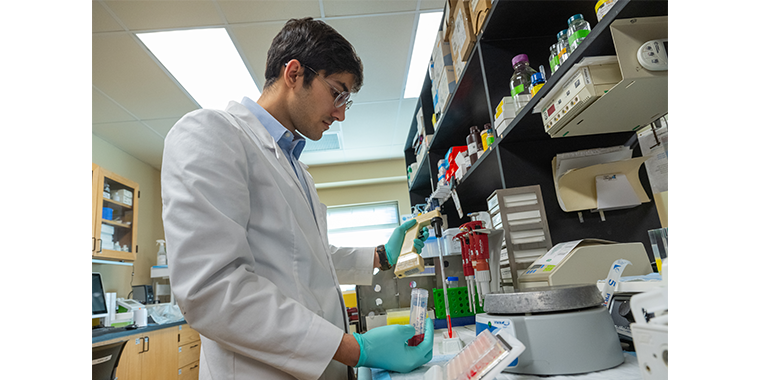If you’re passionate about science, health or innovation—and you're ready to take your career to the next level—a Master’s in Biosciences from Kansas City University (KCU) could be your perfect launchpad. Whether your dream is to become a physician, contribute to cutting-edge cancer research or join the booming biotech industry, this flexible and rigorous program opens doors to a wide range of in-demand careers.
According to the U.S. Bureau of Labor Statistics, jobs for medical scientists are projected to grow 17 percent through 2029, well above the national average. KCU equips you with the skills and connections to meet that demand.
While this list highlights promising career paths, there are many other biosciences degree career opportunities, including roles in public health, biomedical engineering, patent law and more.
Where a Master’s in Biosciences can take you:
Medical, dental or physician assistant school preparation
Strengthen your credentials and stand out as an applicant.
If your goal is to become a doctor, dentist or physician assistant (PA), KCU’s Master’s in Biosciences gives you the academic and professional edge you need to be a competitive applicant. This program is designed to elevate your GPA, reinforce your scientific foundation and provide individualized support from faculty who understand the admissions process. Students take courses modeled after medical school curricula and receive personalized guidance on preparing for entrance exams like the MCAT or DAT.
With a strong track record of alumni success, KCU’s program has helped hundreds of students gain acceptance to competitive medical, dental and PA programs across the country.
- Common outcomes: Acceptance into medical, dental or physician assistant programs
- Median salary post-program:
- Career outlook: The demand for physicians, dentists and physician assistants continues to rise, driven by population growth and expanded health care access. A Master’s in Biosciences can strengthen your application and improve acceptance into these competitive programs.
Biotechnology and the pharmaceutical industry
Drive innovation in drug development and diagnostics.
Biotech and pharmaceutical companies are rapidly expanding and hiring professionals with strong research and lab backgrounds. With a Master’s in Biosciences, you can pursue careers in research and development (R&D), regulatory affairs, data analysis, quality assurance or laboratory operations. You’ll be well-prepared to contribute to life-saving innovations, from vaccines and biologics to genomic testing and AI-powered drug discovery. This path suits students interested in applying scientific knowledge in real-world settings that impact global health and wellbeing. KCU grads are uniquely positioned for success with experience in molecular biology, cell culture and bioinformatics.
- Employers include:
- Thermo Fisher Scientific
- Moderna
- Bayer
- Median salary: $93,330
- Potential roles:
- Clinical research associate
- Regulatory affairs specialist
- Biostatistician
- Bioinformatics analyst
- Career outlook: The biotechnology and pharmaceutical industries are rapidly growing, with increasing demand for professionals skilled in research, data analysis, and regulatory affairs. Careers with a Master’s in Biosciences offer strong job security and upward mobility in these innovation-driven fields.
Biomedical research
Contribute to scientific breakthroughs that save lives.
If you’re passionate about discovery and innovation, a career in biomedical research allows you to explore the frontiers of medicine. With a Master’s in Biosciences, you can work in labs focused on developing new therapies for diseases like cancer, Alzheimer’s, diabetes and autoimmune disorders. Many graduates begin as research assistants or technicians and advance to roles as project leads or lab managers.
Research is a collaborative field that intersects with public health, pharmacology and engineering—providing ample room for growth. This is an ideal path for students interested in solving complex health challenges through science.
- Employers include:
- National Institutes of Health (NIH)
- Stowers Institute for Medical Research
- Pfizer
- Children’s Mercy Hospital
- Mayo Clinic
- Median salary: $103,650
- Career outlook: Biomedical research is a high-growth sector fueled by advancements in genetics, neuroscience and personalized medicine. Graduates with biosciences degrees are well-positioned to contribute to life-saving discoveries in academic, clinical and corporate settings.
PhD in biomedical sciences
Advance your research through doctoral study.
For those interested in leading-edge academic or industry research, a Master’s in Biosciences is an excellent stepping stone to a PhD program. Graduates often go on to earn fully funded doctorates in biomedical sciences, molecular biology, neuroscience, immunology or genetics. PhD programs typically offer tuition waivers and stipends, along with opportunities to publish and present at national conferences.
Whether your goal is to teach at the university level, lead a biotech research division or join a government agency like the CDC, a PhD offers unmatched depth of expertise and credibility.
- Outcome: Admission to PhD programs with tuition waivers and research stipends
- Fields of study:
- Cell biology
- Virology
- Pharmacology
- Neuroscience
- Public health
- Median academic research salary: $83,980
- Career Outlook: A Master’s in Biosciences provides a strong foundation for doctoral study, opening doors to fully funded PhD programs. Career opportunities after a PhD include academic research, biotech leadership and scientific consulting.
College-level teaching
Inspire future scientists and health professionals.
If you’re drawn to education, teaching at the college level is a rewarding way to share your knowledge and shape the next generation of STEM professionals. With a Master’s in Biosciences, you can teach anatomy, physiology, microbiology or general biology at community colleges, four-year universities or online institutions. Many instructors later pursue doctoral degrees to broaden their teaching portfolio or move into tenure-track roles.
Beyond classroom instruction, this path may also involve mentoring students, developing lab curriculum or contributing to academic research.
- Where you might teach:
- Community colleges
- Universities
- Online institutions
- Median salary: $83,920
- Career Outlook: With increasing enrollment in health and science programs, demand for qualified biology and biosciences instructors remains strong. A Master’s in Biosciences enables teaching at the college level and supports advancement in higher education careers.
Why choose KCU’s master’s in biosciences?
KCU’s Master of Science in Biosciences is more than a degree—it’s a personalized, research-driven experience designed to position you for success in clinical, academic or industry careers.
What sets KCU apart:
- Individualized curriculum tailored to your academic background and career goals
- Dedicated research track that allows you to explore topics of personal and professional interest
- Hands-on opportunity to design and complete an original research project
- Close mentorship from experienced research scientists and active faculty researchers
- Proximity to leading institutions, with Kansas City home to some of the nation’s top biomedical and clinical research facilities
- Faculty actively engaged in discovery, with ongoing work in areas such as molecular biology, immunology, neuroscience and public health
Ready to take the next step?
To explore how KCU’s Master’s in Biosciences can help you reach your goals in health care, science and beyond, unlocking exciting biosciences degree career opportunities, click here.


_20240823155745_0.png?w=140&h=140)

(0) Comments